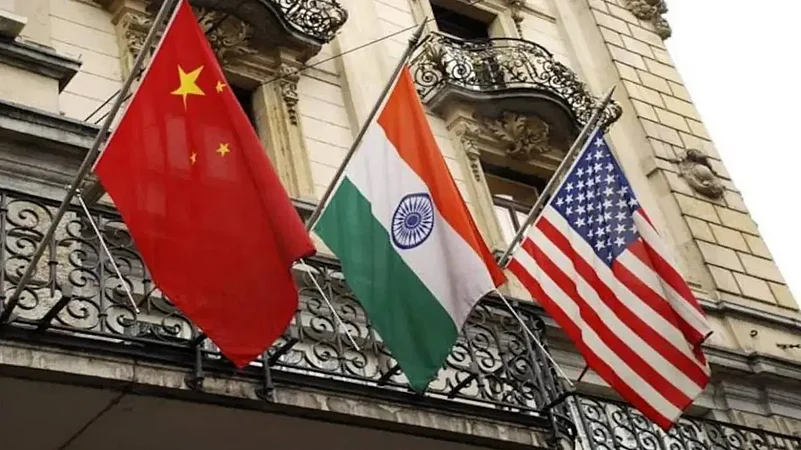As the Ukraine war or the war over Ukraine- emblematic of the deteriorating relations between the ‘East and the ‘West’- grinds on and as alliances- real and implicit- that inform the ‘dividing line’ of Cold War 2.0 shape up, reviewing the nature of the emerging world order may be easy. ( The use of the word ‘emblematic’ is not to demean or underplay the sufferings of Ukrainians. It is merely to illustrate a point). The real issue and question is not the nature of world order (or disorder) and the emergent Cold War 2.0-a foregone conclusion- but to tease out the possibility and potential of global peace, stability and co-existence: Can, given the rumblings of world disorder, induced by the war over Ukraine , as counterintuitive as it may sound , concentrate minds and lead to a consensus over peace? Is peace the concomitant of stability or vice versa? And can either be the predicate for co-existence among and between states and civilizations? Last but not the least, can an inter-civilizational dialogue give short shrift to frisson and friction between civilizations, leading to a ‘new’ paradigm of amity and cooperation?
All these questions are interrelated and never has the salience of these questions been as important as it is now- a time when the use of nuclear weapons has morphed from mere deterrence and implied use to actual ones. (More than anything else, it is this prospect laden with apocalyptic overtones and undertones that must make statesmen (women) scramble to their desks and huddle together for world peace). This, then, obiter dictum, is not a vain intellectual exercise but a real issue, the resolution and an answer upon which the fate of the world is contingent. So, how can the much-needed inter-civilizational dialogue between the East and the West be arrived at?
One starting point could and must be the prosaic observation and even fact that both the ‘East’ and the ‘West’ are constructs and categories. There is nothing immutable or fixed about these constructs. Plus there is such diversity and difference(s) between these that speaking of one monolithic category becomes moot. If this holds, then there is scope for some kind of dialogue between the ‘East and the ‘West’. But, one major intervening variable that potentially and practically throws the proverbial spanner into the works of dialogue is the state form of political organization. The state, as International theory and practice tells us is the fundamental unit of world politics. When allied to territory and geography, the state form of political organization begets geopolitics, a feature of world politics that was supposed to be occluded by globalization but has, with the war over Ukraine made a return.
Contrary to some culturalist theories and political ones, the state form of organization is not going to go away. It will - despite the formation of the European Union, a super state that sought to transcend both the state and its concomitant, sovereignty - endure and remain. The axiomatic corollary here is that if the state will endure, so will interstate competition. The danger is if and when interstate competition devolves in to civilizational conflict, a condition that unlike interstate conflict can be a zero-sum one. While there are antidotes that can ameliorate interstate conflict, inter-civilizational conflict is ominous and lends itself to no easy solutions. But if civilizations are held to be non- essentialist constructs, then potentially there are grounds for hope. The question is how?
First, a common minimum program, so to speak, must be devised to find out commonalities between civilizations. For example, the humanness of all mankind can be a useful predicate for this. In prosaic terms, this means we are all human and that it is culture- another malleable and fluid construct and concept- that makes us different. It is here that we enter and traverse tricky terrain. The allusion to the ‘nature’ versus ‘nurture’ debate has often been times employed as a theoretical and practical device to assert the primacy of one particular civilization and suggest that the ‘logical’ end point of humanity’s progress is emulation and acceptance of its main premises by ‘others’. More than anything else, it is this along with a melange of other factors that have bred resistance and even conflict. This is not to suggest any paradigm is flawed but the moment universalisms jockey and jostle for space, attention, and time, the reflex of resistance sets in a sure-shot recipe for conflict and depredation. (The same holds true for other entities that have universalisms inherent to them).
The aspiration to universalism(s) and their reification jostle with the historical memory of peoples and societies. Say, if the West , holds itself to be a paragon and beacon of certain values and seeks their entrenchment , the historical memory of colonialism and imperialism kicks in and other societies become truculent, deeming this particular universalism as ‘old wine in new bottle’ – in other words, colonialism packaged in the idiom of post colonialism. In China, for instance, the memory of the Opium Wars is etched in the historical memory of its people, or more accurately, its elite, as the ‘hundred years of humiliation’, something to never be allowed to repeat. While the Chinese elite may have pretty quotidian and prosaic reasons in terms of governance, and government, international relations, and so on, the ‘hundred years of humiliation’ formulation yields itself to many uses.
One step with potentially positive implications is then to shed universalisms by every civilization that forms the world’s firmament. This is not to suggest ‘cultural relativism. Neither is it supposed to mean that civilizations shed their special character. It merely means that civilizations accept each other, on , to repeat, the basis of a ‘common minimum program’. This, yet again, at the risk of tautology , could mean employing the starting point of treating the peoples of the world as people, as human beings albeit flawed ones, with somewhat similar fears, hopes, desires, aspirations and so on. But a caveat is in order here: while cultural relativism is to be disavowed, value relativism must be respected. That is, peoples’ across the world and across the civilizational divide cherish and dearly respect values and that no judgment calls must be made on these. This raises the question of what values and for who?
Values such as truth, valor respect, honour, trust, beauty and aesthetics are almost universal despite assuming different forms and avatars. These values are as universal as can be and conflict or differences over thee amounts to a mere quibble. It is these that can inform the grist to the mill of a dialogue between civilizations and thereby a predicate for, if not amity between civilizations but surely a premise for co-existence. Any other formulation or formula given that some normative frameworks of international relations have been rent asunder by the war over Ukraine( the use of force and nuclear weapons, for instance) has apocalyptic overtones. If for nothing else but the survival of the world and species, the world has to come together and forge a bold and beautiful paradigm that smells of roses. For reference, the historical poem written by Rudyard Kipling, an unabashed Orientalist who had a change of heart and probably wrote the poem , ‘The Ballad of East and West’ probably as atonement to his vulgar novel, 'Kim' lyricized geographically the East and the West can never meet. But as emblematized by the relationship between Kamal, a tribal chieftain in the North West Frontier province and British Colonels son, both arch antagonists , in their respective chases , duels and fights develop respect for each other, with both swearing blood brotherhood to and with each other. In this ballad, Kipling enjoined that when equals meet, accidents of birth, nationality, race and so on do not matter. What matters are character, integrity, valour and prowess. Kipling, hitherto the arch protagonist and proponent of Empire and racial superiority had a change of heart. He saw it all in blood and sweat. Can civilizations wake up and do the same? For starters, if this awakening occurs, the people of Ukraine might get a respite and the world, at large, might not suffer a doomed fate.























